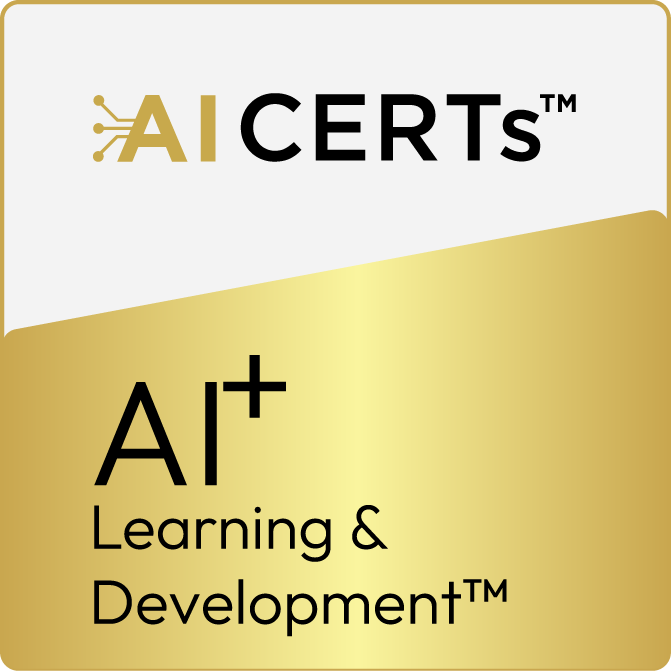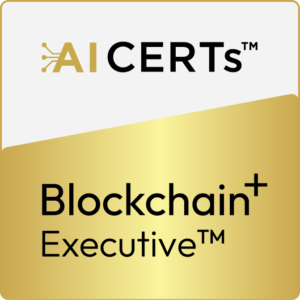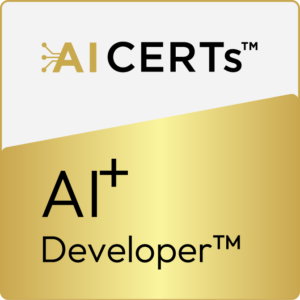Description
AI+ Learning & Development (1 Day)
Program Detailed Curriculum
Executive Summary
The AI+ Learning & Development certification offers a comprehensive examination of AI’s transformative
capabilities within educational settings. Through a series of modules encompassing Machine Learning,
Natural Language Processing, Ethical considerations, and Emerging Trends, participants acquire a
profound comprehension of AI fundamentals and their practical implications. Participants will learn to
design adaptive learning systems and navigate ethical dilemmas, fostering responsible implementation of
AI solutions. The course culminates in a capstone project, enabling learners to tackle real-world
educational challenges with their acquired knowledge. By the course’s conclusion, participants are
empowered to spearhead innovation and elevate learning outcomes using AI-driven strategies.
Course Prerequisites
A basic understanding of artificial intelligence concepts and terminologies.
Familiarity with learning theories and instructional design principles.
Proficiency in using digital tools and platforms for educational purposes.
Some experience in educational or training roles, such as teaching, content development, or
instructional design.
A willingness to engage with technical subjects and apply AI technologies in the context of learning and
development.
Module 1
Introduction to Artificial Intelligence (AI) in Education
1.1 Overview of Artificial Intelligence
Definition and Types of AI: Explore the fundamentals of AI, including its definition, core principles, and various types
like machine learning, neural networks, and expert systems.
History of AI: Trace the evolution of AI from its inception, examining key milestones, pioneering figures, and
significant breakthroughs that have shaped the field’s trajectory.
Current Trends in AI: Dive into the latest developments in AI technology, including advancements in deep learning,
ethical AI, quantum computing’s impact, and emerging applications across industries.
1.2 AI’s Role in Education and Training
Personalized Learning: Discover the power of tailoring education to individual learning styles, leveraging AI to
create dynamic, student-centered experiences that improve engagement and outcomes.
Automated Administration: Learn how AI and automation revolutionize educational administration, from
streamlining administrative tasks to enhancing student support services and institutional efficiency.
Content Delivery and Adaptive Learning: Explore advanced methods for delivering educational content that
adapts in real-time to each learner’s progress, knowledge, and learning preferences, optimizing their educational
journey.
1.3 Impact of AI on Educational Content Creation
Content Customization and Generation: Explore how AI enables the creation and customization of educational
content to meet diverse learner needs, enhancing engagement and personalizing the learning experience.
Language Models in Education: Discover the transformative role of language models in education, from
automating feedback to personalizing learning materials and facilitating immersive language learning experiences.
Augmented and Virtual Reality: Dive into the immersive world of AR and VR in education, learning how these
technologies offer hands-on experiences, enhance engagement, and simulate real-world scenarios.
1.4 AI in Assessment and Feedback
Automated Grading Systems: Learn about the technology behind automated grading systems, their benefits in
saving time and providing immediate feedback, and challenges in subjective assessment.
Predictive Analytics in Learner Performance: Explore how predictive analytics uses historical data to forecast
student performance, identify at-risk students early, and personalize learning paths for better outcomes.
Feedback for Educators: Discover methods and tools for providing constructive, timely feedback to educators,
enhancing teaching effectiveness, and fostering continuous professional development.
1.5 Ethical Considerations and Challenges
Privacy and Data Security: Safeguarding learner data through protocols for collection, storage, and ethical usage to
ensure confidentiality and compliance.
Bias and Fairness: Promoting equity by mitigating biases in AI systems used for education, fostering an inclusive
learning environment.
Future of AI in Education: Exploring AI’s transformative role in education, discussing implications, and preparing
educators and learners for future demands.
Module 2
Machine Learning Fundamentals
2.1 Introduction to Machine Learning
Definition and Core Concepts: Delve into the foundational concepts of machine learning, understanding its
definition, key principles, and the theoretical underpinnings that drive AI innovation.
Types of Machine Learning: Explore the various types of machine learning, including supervised, unsupervised, and
reinforcement learning, highlighting their differences, uses, and examples.
Applications in L&D: Examine how machine learning is revolutionizing Learning & Development (L&D), from
personalized learning paths to automated content generation and analytics-driven insights.
2.2 Supervised Learning
Algorithm Fundamentals: Introduce the basics of algorithm design and analysis, covering essential concepts like
complexity, efficiency, and common algorithms used in AI and machine learning.
Training and Testing Models: Learn the processes of training and validating machine learning models, including
data splitting, model evaluation metrics, and techniques to avoid overfitting.
Use Cases in L&D: Explore specific applications of machine learning algorithms in Learning & Development, such as
adaptive learning systems, predictive analytics for student performance, and content customization.
2.3 Unsupervised Learning
Algorithm Fundamentals: Dive into the core principles behind algorithms in machine learning, including how they
are constructed, optimized, and applied to solve complex problems efficiently.
Finding Patterns in Data: Explore techniques and algorithms for uncovering hidden patterns and insights in large
datasets, crucial for predictive modeling and data-driven decision-making in various fields.
Use Cases in L&D: Investigate how machine learning and data analysis are applied in Learning & Development,
enhancing personalized learning experiences, optimizing educational outcomes, and automating administrative
tasks.
2.4 Reinforcement Learning
Basic Principles: Uncover the foundational principles of machine learning and artificial intelligence, focusing on
how algorithms learn from data to make predictions or decisions.
Algorithm Examples: Examine specific algorithm examples such as decision trees, neural networks, and support
vector machines, highlighting their workings, strengths, and limitations.
Applications in L&D: Explore the impact of machine learning algorithms on Learning & Development, from
customizing learning experiences to automating assessment and providing actionable insights into learner
engagement.
2.5 Machine Learning in Practice
Data Preparation and Cleaning: Learn the critical steps of preparing and cleaning data for machine learning,
including handling missing values, outliers, and feature engineering to ensure model accuracy.
Evaluating Model Performance: Discover methods to assess the performance of machine learning models,
including confusion matrices, ROC curves, precision-recall, and techniques for validation and cross-validation.
Ethical Considerations and Bias Mitigation: Explore the ethical implications of AI and machine learning, focusing
on identifying and mitigating biases in algorithms to ensure fairness, transparency, and accountability in automated
decision-making.
Module 3
Natural Language Processing (NLP) for Educational Content
3.1 Fundamentals of NLP in Education
Introduction to NLP: Dive into Natural Language Processing (NLP), understanding its fundamentals, how
computers interpret human language, and its significance in bridging human-computer interaction.
Key NLP Technologies: Explore essential NLP technologies such as tokenization, part-of-speech tagging, named
entity recognition, and sentiment analysis, and their applications in analyzing text data.
Language Models: Learn about language models, from rule-based to statistical and neural network models,
focusing on how they generate and understand text, with examples like GPT and BERT.
3.2 Content Analysis and Enhancement
Text Analysis for Learning Materials: Discover how text analysis techniques are applied to learning materials,
enhancing content personalization, and ensuring materials meet diverse learner needs effectively.
Readability and Complexity Assessment: Learn about methods and tools used to assess the readability and
complexity of text, enabling the creation of learning materials that match learners’ proficiency levels.
Semantic Content Enrichment: Explore strategies for enriching educational content semantically, using NLP to add
context, improve understanding, and create dynamic, interactive learning experiences.
3.3 Personalized Learning and Adaptive Content
Learner Profiling and Needs Analysis: Understand how to gather and analyze data on learners’ backgrounds,
preferences, and performance to create detailed profiles for personalized learning experiences.
Adaptive Content Generation: Explore the technologies and methodologies behind creating dynamic, adaptive
content that adjusts in real-time to a learner’s progress, knowledge level, and learning style.
Dialogue Systems and Chatbots for Learning: Dive into the development and application of AI-powered dialogue
systems and chatbots designed to facilitate interactive learning, provide instant feedback, and support learners 24/7.
3.4 Assessment and Feedback Automation
Automated Essay Scoring: Learn about the algorithms and models behind automated essay scoring systems,
which assess written responses for quality, coherence, and content, streamlining the grading process.
Sentiment Analysis for Feedback Interpretation: Explore how sentiment analysis techniques are applied to
interpret emotions and opinions in feedback, aiding educators in understanding students’ experiences and
improving course delivery.
Predictive Analytics for Performance Monitoring: Discover the use of predictive analytics in education to monitor
student performance, identify at-risk students early, and tailor interventions to support their success effectively.
Module 4
AI-Driven Content Creation and Curation
4.1 AI in Generating Educational Content
Automated Content Generation: Dive into how AI algorithms are used to automatically generate educational
content, reducing the time educators spend on content creation and enabling scalability.
Enhancing Creativity: Explore methods and tools that leverage AI to foster creativity in learners, including creative
writing aids, art generation tools, and music composition applications.
Customization and Localization: Learn about tailoring educational content to fit the cultural and linguistic needs of
diverse learners, enhancing accessibility, engagement, and learning outcomes.
4.2 Adaptive Learning Materials Creation
Personalized Learning Paths: Discover the strategies and technologies used to design personalized learning paths
that adapt to individual learner profiles, preferences, and performance, enhancing engagement and outcomes.
Real-time Content Adaptation: Explore how AI enables the dynamic adaptation of content in real-time, ensuring
that learning materials are always aligned with the learner’s current knowledge level and learning pace.
Integration with Learning Management Systems (LMS): Learn about the seamless integration of AI technologies
with Learning Management Systems to enhance functionality, automate processes, and provide advanced analytics
for both learners and educators.
4.3 Dynamic Assessment Item Generation
Automating Question Creation: Explore how AI algorithms can automatically generate diverse and relevant
questions for quizzes and assessments, saving time and ensuring a wide coverage of the material.
Adaptive Testing: Learn about adaptive testing mechanisms that adjust the difficulty of questions in real-time
based on the learner’s performance, providing a personalized assessment experience.
Instant Feedback Mechanisms: Discover the technologies behind providing instant feedback to learners, including
automated grading systems and AI-driven tutoring systems that enhance learning efficiency and engagement.
4.4 Curating Educational Resources
Content Aggregation and Filtering: Explore the use of AI to aggregate and filter vast amounts of educational
content from various sources, ensuring learners have access to the most relevant materials.
Relevance and Quality Scoring: Learn about algorithms that assess the relevance and quality of educational
content, enabling personalized recommendations that match learners’ needs and preferences.
Continuous Content Update: Discover the strategies and systems in place for continuously updating learning
materials, ensuring content remains current, accurate, and engaging for learners.
4.5 Challenges and Ethical Considerations in AI-Driven Content
Maintaining Accuracy and Reliability: Explore methods and technologies for ensuring that educational content
remains accurate and reliable, including fact-checking algorithms and expert validation processes.
Addressing Bias in Content Creation: Learn about strategies to identify and mitigate bias in educational content
creation, promoting inclusivity and fairness through diverse data sources and algorithmic transparency.
Intellectual Property and Copyright Issues: Discover the challenges and solutions related to intellectual property
and copyright in digital education, focusing on compliance, ethical use of materials, and content licensing.
Module 5
Adaptive Learning Systems
5.1 Foundations of Adaptive Learning
Principles of Adaptive Learning: Explore the foundational principles of adaptive learning, including how it
personalizes educational experiences by adjusting to a learner’s strengths, weaknesses, and preferences in real-time.
Technologies Behind Adaptive Learning: Learn about the key technologies powering adaptive learning systems,
such as AI algorithms, machine learning models, and data analytics, which facilitate personalized education
pathways.
Benefits and Challenges: Discover the benefits of adaptive learning, such as improved engagement and outcomes,
along with the challenges it faces, including data privacy concerns and the complexity of implementation.
5.2 Designing Adaptive Learning Systems
Learner Modeling: Dive into the creation and use of learner models, which represent the knowledge, skills, and
attributes of learners to tailor educational experiences to their individual needs.
Content Modeling: Explore how content modeling organizes and structures educational materials to be easily
adaptable and aligned with various learning objectives and learner profiles.
Adaptivity and Personalization Mechanisms: Learn about the mechanisms and algorithms that enable adaptive
learning systems to provide personalized learning experiences, adjusting content and pedagogical strategies in real-
time to meet learners’ evolving needs.
5.3 Implementation Strategies
Integration with Existing Systems: Examine strategies for seamlessly integrating adaptive learning technologies
with existing educational systems and infrastructures, ensuring compatibility and enhancing the learning
ecosystem.
Scalability and Accessibility: Discover how adaptive learning systems are designed for scalability, to support an
increasing number of learners, and accessibility, ensuring all learners, including those with disabilities, have equal
access to personalized education.
Continuous Improvement and Feedback Loops: Learn about the importance of continuous improvement in
adaptive learning systems, facilitated by feedback loops from learners and educators, to refine and enhance the
personalization algorithms and content delivery.
5.4 Assessment and Evaluation in Adaptive Systems
Dynamic Assessment Methods: Explore assessment methods that adapt to a learner’s responses in real time,
providing a more accurate measure of their understanding and skills by adjusting difficulty and offering tailored
challenges.
Feedback and Support: Learn about the systems in place for providing immediate, personalized feedback and
support to learners, helping them understand mistakes, reinforce knowledge, and encourage growth at every step.
Measuring Effectiveness: Discover how the effectiveness of educational programs and technologies is measured,
including metrics for engagement, learning outcomes, and long-term retention, to ensure continuous
improvement.
5.5. Ethical and Privacy Considerations
Data Privacy and Security: Examine the critical importance of protecting learner data in educational technologies,
including strategies for encryption, anonymization, and compliance with data protection regulations.
Bias and Fairness in AI: Explore the challenges and solutions for identifying and mitigating bias in AI algorithms
used in education, ensuring fairness and equality in personalized learning experiences.
Informed Consent and Transparency: Learn about the principles of informed consent and transparency in the use
of educational technologies, emphasizing the need for clear communication about data use, collection, and rights.
Module 6
Ethics and Bias in AI for L&D
6.1. Understanding AI Ethics in L&D
Fundamentals of AI Ethics: Discover the foundational principles of AI ethics, including the importance of
responsible AI development, considerations of impact on society, and the need for ethical guidelines.
Ethical Design and Development: Explore how ethical considerations can be integrated into the design and
development of AI systems, ensuring they are fair, transparent, accountable, and respect user privacy.
Global Perspectives on AI Ethics: Learn about the diverse global perspectives on AI ethics, examining how cultural,
legal, and societal differences influence the formulation and implementation of AI ethical standards.
6.2 Privacy Concerns in AI-Driven L&D
Data Privacy Principles: Dive into the core principles of data privacy, focusing on the ethical management of data
collection, processing, and storage within AI-driven Learning & Development (L&D) programs, highlighting the
balance between innovation and individual privacy rights.
Consent and Data Control: Discover the importance of obtaining informed consent and providing learners with
control over their personal data. Learn strategies for implementing these practices effectively in AI L&D
environments to uphold privacy rights and build trust.
Mitigating Privacy Risks: Explore best practices for protecting learner data in AI L&D projects, including securing
data against breaches, ensuring confidentiality, and implementing robust access controls to mitigate privacy risks
and safeguard sensitive information.
6.3 Bias and Fairness in AI Assessments
Identifying Biases in AI: Learn about the different types of biases that can exist in AI systems, including data bias,
algorithmic bias, and confirmation bias, and how to identify them in the context of learning and development (L&D)
applications.
Impact of Bias on L&D Outcomes: Examine the negative impacts that biases in AI can have on L&D outcomes, such
as reinforcing stereotypes, creating unfair advantages or disadvantages for certain groups, and undermining the
accuracy and effectiveness of educational content and assessments.
Strategies for Mitigating Bias: Discover strategies for mitigating bias in AI-driven L&D initiatives, including diverse
data collection, algorithmic transparency, regular audits for bias, and inclusive design principles that ensure fairness
and equality in learning experiences.
6.4 Ethical AI Use and Learner Engagement
Engaging Learners Ethically: Explore ethical approaches to engaging learners in AI-enhanced educational
environments, emphasizing respect for learner privacy, personalized learning that supports diverse needs, and the
avoidance of manipulative practices.
Transparency with AI Tools: Learn about the importance of transparency in the use of AI tools in education,
including clear communication about how AI is used, the data it collects, and how decisions are made, to build trust
and understanding among learners.
Learner Autonomy and AI: Discover strategies for preserving and promoting learner autonomy in AI-driven
learning environments, ensuring that AI tools empower learners to make choices about their learning paths,
content, and pace, while supporting their overall educational goals.
6.5 Future Challenges and Opportunities
Evolving Ethical Standards: Explore the dynamic landscape of ethical standards in AI, focusing on how these
standards are evolving to address new challenges and ensure responsible use of AI in various sectors, including
Learning & Development (L&D).
Innovations in Ethical AI: Learn about recent innovations aimed at enhancing the ethical use of AI, such as
development of more transparent algorithms, ethical AI frameworks, and tools that enable greater accountability
and fairness in AI applications.
Preparing for an AI-Ethical Future in L&D: Discover strategies for preparing L&D professionals and organizations
for an ethically-conscious AI future, including education on ethical AI use, implementation of ethical guidelines, and
fostering a culture of continuous ethical reflection and improvement.
Module 7
Emerging Technologies and Future Trends
7.1 Augmented Reality (AR) in Education
AR for Interactive Learning: Dive into how Augmented Reality (AR) is transforming interactive learning by creating
immersive educational experiences that blend digital elements with the real world, enhancing engagement and
comprehension.
Practical Applications of AR: Explore the wide range of practical applications of AR in education, from visualizing
complex concepts in science and mathematics to facilitating historical site exploration and language learning
through interactive, real-world overlays.
Development Tools and Challenges: Learn about the tools and platforms used for developing AR applications in
learning, including Unity and ARKit, as well as the challenges developers face, such as hardware limitations, user
accessibility, and creating content that effectively achieves educational objectives.
7.2 Virtual Reality (VR) in Learning Environments
VR for Immersive Experiences: Explore the use of Virtual Reality (VR) to create deeply immersive learning
experiences, allowing students to explore virtual environments and scenarios that enhance understanding and
retention of educational content.
Curriculum Integration: Discover strategies for integrating VR into educational curricula, including aligning VR
experiences with learning objectives, ensuring inclusivity, and assessing the impact on student engagement and
achievement.
Hardware and Software Considerations: Learn about the critical hardware and software considerations for
implementing VR in education, including the selection of VR headsets, compatibility with existing systems, and the
development of or investment in VR educational content.
7.3 AI-Driven Personalized Learning
Adaptive Learning Platforms: Dive into how adaptive learning platforms use AI to tailor educational experiences to
individual learner needs, preferences, and performance, offering a personalized path through curriculum materials
and activities.
Predictive Analytics in Education: Explore the role of predictive analytics in education, from forecasting student
performance and identifying at-risk students early, to customizing learning experiences and improving educational
outcomes through data-driven insights.
Ethical and Privacy Concerns: Understand the ethical and privacy concerns associated with the use of adaptive
learning platforms and predictive analytics, including data protection, consent, bias mitigation, and ensuring
transparency and fairness in algorithmic decision-making.
7.4 Blockchain in Education
Secure Learning Records: Explore the technologies and methodologies for maintaining secure, verifiable, and
portable learning records, utilizing advancements in encryption and blockchain to safeguard academic credentials
and enable lifelong learning tracking.
Smart Contracts for Education: Learn about the application of smart contracts within the educational sector,
including automating administrative processes, verifying achievements and credentials, and enabling new models
of teaching and learning that are transparent, efficient, and trust-based.
Decentralized Education Systems: Dive into the concept of decentralized education systems, where learning
management and record-keeping are distributed across a blockchain network, offering increased autonomy to
learners and educators, and reducing dependency on central authorities.
7.5 Emerging AI Technologies in Educational Research and Development
Natural Language Processing (NLP) Enhancements: Explore advancements in NLP that improve understanding,
generation, and interaction with human language, enhancing applications like language translation, sentiment
analysis, and automated summarization in educational content and tools.
Generative AI for Content Creation: Learn about the role of generative AI in creating educational materials, from
generating customizable and adaptive content to providing innovative approaches for creating engaging and
diverse learning experiences.
Ethical AI and Inclusive Technologies: Discover the importance of ethical considerations in AI development and
deployment, focusing on creating inclusive technologies that address accessibility, prevent bias, and ensure fairness,
contributing to equitable learning environments for all.
Module 8
Implementation and Best Practices
8.1 Strategic Planning for AI Integration
Needs Assessment: Dive into the process of conducting needs assessments in educational technology projects,
focusing on identifying the specific requirements, challenges, and goals of learners and educators to inform the
development and implementation of effective solutions.
Technology Alignment: Explore strategies for aligning technology choices with educational objectives, ensuring
that the selected tools and platforms not only meet the identified needs but also enhance learning experiences and
outcomes in meaningful ways.
Stakeholder Engagement: Learn about the importance of engaging all stakeholders, including students, teachers,
administrators, and parents, in the development and deployment of educational technologies, ensuring their needs
are met and fostering a sense of ownership and collaboration.
8.2 Selecting the Right AI Tools
Evaluating AI Solutions: Discover effective methodologies for evaluating AI solutions, analyzing costs, benefits, and
risks to optimize organizational efficiency and strategic alignment.
Cost-Benefit Analysis: Master the art of conducting cost-benefit analysis tailored to AI projects, leveraging financial
metrics to maximize ROI and mitigate risks effectively.
Vendor Selection and Partnerships: Navigate the complexities of vendor selection and partnership building in the
AI industry, emphasizing alignment with organizational goals for mutual success and innovation.
8.3 Implementing AI Solutions
Pilot Programs: Initiate small-scale trials to test AI solutions in real-world scenarios, enabling iterative
improvements and risk mitigation before full-scale deployment.
Training and Support: Provide comprehensive training and ongoing support to users, ensuring proficiency in AI
tools and addressing challenges for successful implementation.
Integration with Existing Systems: Seamlessly integrate AI solutions with current systems and workflows,
optimizing efficiency and leveraging existing infrastructure for maximum effectiveness.
8.4 Monitoring and Evaluating Impact
Performance Metrics: Establish key indicators to measure AI system effectiveness, enabling objective evaluation
and optimization for desired outcomes.
Continuous Feedback Loops: Implement processes to collect, analyze, and integrate feedback seamlessly,
facilitating ongoing improvement and adaptation in AI systems.
Adaptive Learning and Iteration: Foster a culture of learning and iteration within AI systems, enabling dynamic
adjustments and enhancements based on evolving requirements and insights.
8.5. Ethical Use and Data Governance
Data Privacy and Security: Implement measures to safeguard data integrity and confidentiality, ensuring
compliance with regulations and maintaining user trust in AI systems.
Ethical AI Practices: Uphold ethical principles in AI development and deployment, addressing biases, fairness,
transparency, and accountability to promote responsible AI use.
Regulatory Compliance: Ensure adherence to legal requirements and standards governing AI usage, mitigating
risks and liabilities associated with non-compliance while fostering trust and credibility.
AI+ Learning & Development™ Detailed Curriculum
Date Issued: 20/01/2024
Version: 1.1







Reviews
There are no reviews yet.